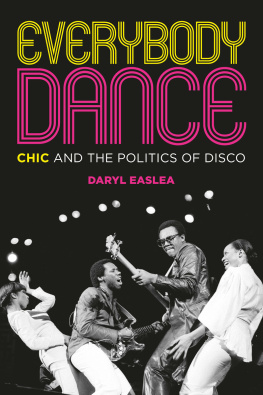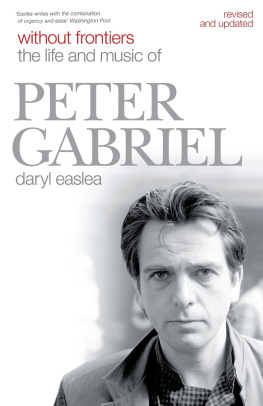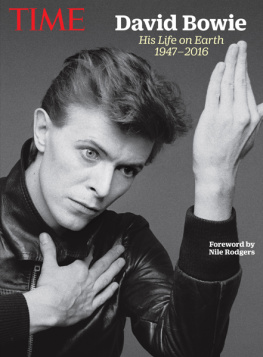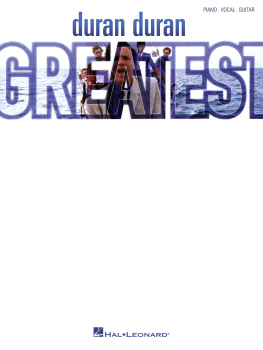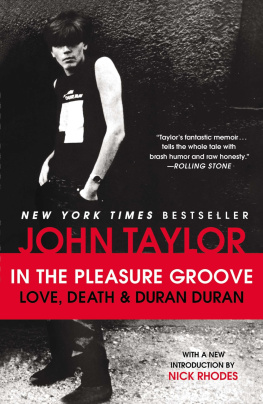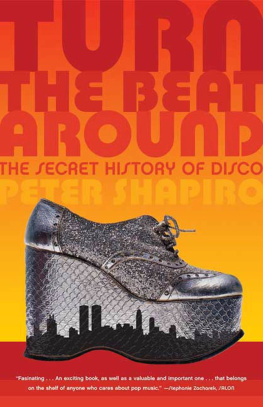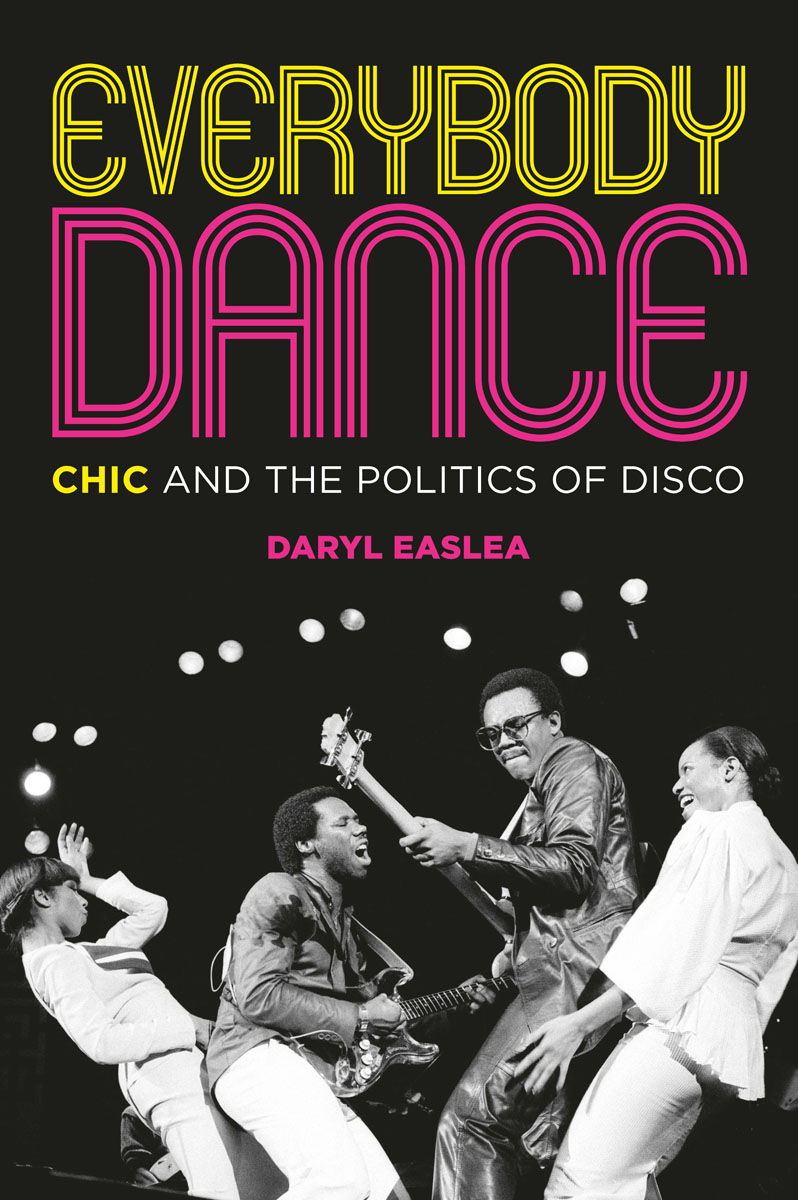
Also by the Author
The Story Of The Supremes
Talent Is An Asset: The Story Of Sparks
Madonna (with Eddi Feigel)
Crazy In Love: The Beyonc Knowles Biography
Cher: All I Really Want To Do (with Eddi Feigel)
Without Frontiers: The Life And Music Of Peter Gabriel
Rewind: The Life And Legacy Of Pop Musics King
The Supreme Record Company: The Story Of Decca Records
1929-2019 (co-editor, contributor)
Whatever Happened To Slade? When The Whole World
Went Crazee
To Sean Body, thank you for all this think of you often.
To Jules and Flora, K50587, Side One, Track Four.
ABOUT THE AUTHOR
D aryl Easlea was in music retail between 1979 and 1997. He left to belatedly take his degree in American Studies and International History at Keele. After graduating in 2000, he became the deputy editor at Record Collector magazine, where he remains a regular contributor. His work has also appeared in Mojo, Prog, The Guardian and Uncut and on bbc.co.uk. As an A&R consultant, he works with a variety of record companies, working with artists and also compiling and annotating CDs and LPs. As a DJ and event host, his work has taken him to Europe and venues such as Abbey Road Studios and the Turbine Hall at Tate Modern. In 2019, he curated the year-long series of events for Decca Records ninetieth anniversary. He broadcasts The Daryl Easlea Spectacular on sfob.co.uk and was born to dance.
He lives with his darling wife and daughter on the north side of the Thames Estuary.
EVERYBODY DANCE
This free state, where each step
is a giant step for all kinds;
an embodied democracy;
here the medium is the art.
Putting an X
in the ballot box of life.
Using bodies
to make sculptures in time.
Sin Hamilton, 2019
CONTENTS
AUTHORS NOTE AND ACKNOWLEDGEMENTS
W hen I finished this, my first book, in 2004, I wrote that I always believed for many years that the story of Chic needed to be chronicled in more than simply a chapter or a paragraph in a wider work. I knew from growing up in the 1970s that there was simply something different about them; Chics look, manner and their remarkable music just marked them out as an enigmatic cut above the rest.
My book set out to contextualise Chic in their time, while also assessing the power, subsequent collapse and rebirth of the disco movement. It was not a history of disco per se; and I rightly acknowledged the countless books that explore this topic from Bill Brewster and Frank Broughtons exemplary Last Night A DJ Saved My Life: The History Of The Disc Jockey to Tim Lawrences well-written and thorough Love Saves The Day: A History Of American Dance Music Culture, 19701979.
Nile Rodgers and Bernard Edwards synthesised their influences into a discrete body of music that has subsequently influenced generations; their work emerged at the time when disco was the prevalent genre. As a result, they became a disco group as opposed to the R&B outfit they would have been a few years earlier, or glossy 1980s dance rock a few years later.
In 200304, talking about Chic was like getting people to discuss some half-remembered confection from another era. In the intervening years, possibly with the book providing one of many kick-starts, Nile Rodgers has become ubiquitous. First, the package tours became bigger, filling arenas. Then, Rodgers was diagnosed with prostate cancer in 2010 his blog (Walking On Planet C) detailing his journey won him a new wave of admirers his own book, Le Freak, was published in 2011 and became a bestseller; a 2012 BBC Four documentary, Nile Rodgers: The Hitmaker, underlined how much he was loved and revered. However, the single biggest moment in Rodgers and Chics rehabilitation was his involvement in one of the biggest-selling singles of the twenty-first century Get Lucky with Pharrell Williams and Daft Punk in 2013.
Since then, Rodgers has been everywhere. The well-kept secret shared by those in the know has become huge news. A change in management led to Rodgers working with Merck Mercuriadis, one of the most accomplished industry operators, who previously looked after the concerns of artists such as Elton John and Iron Maiden. A role as Chief Creative Adviser at Abbey Road Studios gave Rodgers both a high UK profile and a studio base to make Its About Time, Chics first album since 1992.
Everybody Dance: Chic And The Politics Of Disco grew out of an article I wrote pseudonymously for the now-defunct Mojo Collections in October 2001. I then made every attempt to contact everybody associated with the Chic circle. I have been very fortunate that in almost every instance, the ex-members of the group agreed to speak with me. Johnny Mathis declined my overtures in 2004 Im delighted that we spoke in 2019. Certain people I decided early on that I would not contact, as their tales are on the record elsewhere.
Since writing the book, a significant number of the original interviewees have sadly passed away: Tony Thompson has been joined by Joni Sledge, Robert Palmer, Gil Scott-Heron, Ahmet Ertegun, Raymond Jones and, most notably, David Bowie.
A sincere thank you to
Everybody who has been so giving of their time to agree to be interviewed for this project.
In 200104, Nile Rodgers gave as much as he could from his rather packed schedule, and once over his bemusement at me wanting to write a book on him and his group, was charming and supportive. I was delighted to get some face-to-face time with him during his Meltdown in 2019 for this update, and I have also interviewed Nile on four subsequent occasions since the original book in 2008, 2011, 2013, and in July 2018, ahead of Its About Time. These interviews all feed into this edition.
Fran DeFeo and Merck Mercuriadis.
To the memory of Tony Thompson, who spoke with me three times in the months before his tragic death in November 2003. Although weak, his sense of fun and pride in what he had achieved was palpable. A big thank you to his widow, Patrice Jennings-Thompson, for her support and help at a most difficult time for her.
The help and address book of Nile Rodgers unflappable and ever droll personal assistant, Sooze Plunkett-Green (and her team), and both of the websites nilerodgers.com and wearefamilyfoundation.org.
Everyone who agreed to be interviewed especially Karen Milne, who came to the project late and, through her dairies and pocket books, provided an accurate and detailed record of Chic on the road; Raymond Jones for his wit and leads; Alfa Anderson for sharing her tremendous inner calm; Luci Martin for her humour; Fonzi Thornton for being the only person in the story who everybody had a kind word about; Robbie Dupree for his lovely line in self-deprecation; Bernard Edwards Jr; Rob Sabino; and Eddie Martinez.
The British gentlemen: Bryan Ferry, Martin Fry, John Taylor.
Johnny Mathis, who was charm itself.
A special thanks to Mick Jones and Chris Salewicz.
Thanks also to Patric Nilsson aka Pocat (Stockholm), webmaster of the superlative Chic Tribute website: chictribute.com. His associates and contributors, Glen Russell and Graham Lewis. And also for the help I received from the French website Frenchy, So Chic: c-chic.com.
Thank you to Graeme Milton and Michael OConnell at Helter Skelter.
There for me before, and there for me long afterwards: Nick Maslen and Fiona Dutton, Graham James Brown, Wendy Brown, Nathan and Katy, John Suckling, Kevin Simpson and Bernice Owen, Sin Hamilton, Agata Macioszek, Jonaz and Konrad, Alan Hodgson and Felicity Jones, Phillip D. H. Short, Alan Taylor, Chrissie Absalom, the Norfolk Absalom massive, Ian Burfield and Paul Hart Wilden, Phil Pavling, Mark Wood, Nancy Wallace, Patricia and Alan Byford, Sylvia & Co., Liz, Paul, Ian, Kate and the memory of the wonderful Tom and Gwyneth Clarke, and Eryl and Win Batcock.
Next page
